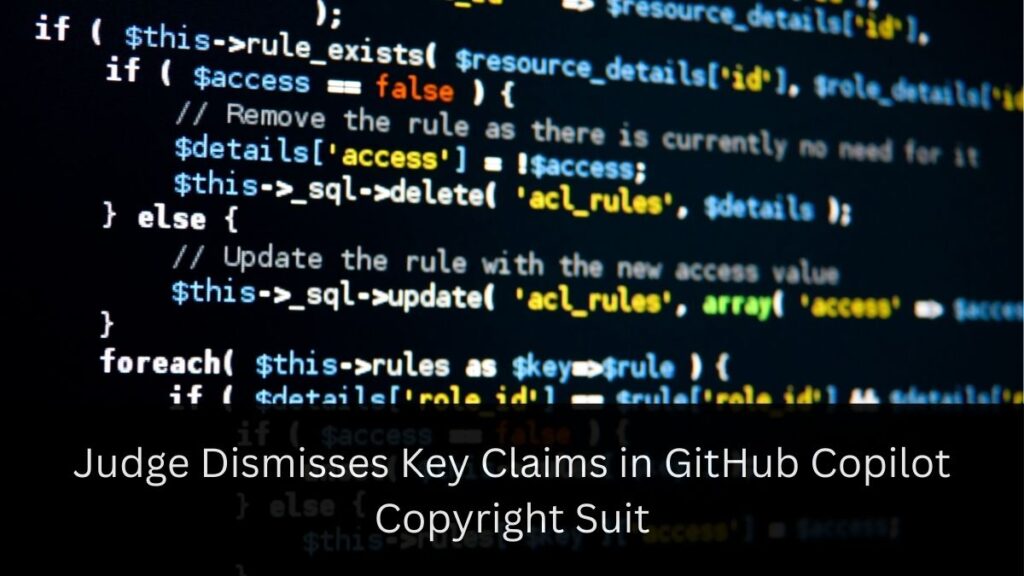The ongoing legal battle against GitHub Copilot, Microsoft’s AI-powered coding assistant, has reached a significant turning point. On Friday, July 5, Judge Jon Tigar dismissed several key claims in the class-action lawsuit brought by developers who allege that Copilot unlawfully copies their code. This decision leaves only two allegations remaining in the case against GitHub, Microsoft, and OpenAI, the entities behind Copilot.
The Origins of the Lawsuit
The lawsuit, filed in November 2022, revolves around the assertion that Copilot was trained on open-source software hosted on GitHub. Plaintiffs claim that Copilot suggests code snippets from these projects without adhering to the original licenses, which include providing appropriate credit. This, they argue, violates the intellectual property rights of the original creators. Given that Microsoft owns GitHub and uses OpenAI’s generative machine-learning technology to power Copilot, the lawsuit has significant implications for all involved parties.
The Dismissal of Key Claims
The original case started with 22 claims, but many have been dismissed as the defending corporations successfully motioned to have them thrown out. Judge Tigar’s recent ruling dismissed three more claims, including a significant one under the Digital Millennium Copyright Act (DMCA), section 1202(b). This section prohibits the removal of crucial “copyright management” information, such as the authorship and terms of use of the code.
Plaintiffs argued that Copilot violated section 1202(b) by stripping out this information when offering code snippets. However, Judge Tigar ruled that the code suggested by Copilot was not identical enough to the developers’ copyrighted work, making section 1202(b) inapplicable. GitHub’s prior adjustments to Copilot, ensuring it generates slight variations of the training code, likely influenced this decision.
The Remaining Allegations
With the dismissal of the DMCA claim, plaintiffs now have two remaining allegations: an open-source license violation and a breach of contract. These surviving claims continue to challenge the legitimacy of Copilot’s operations and its compliance with open-source licenses.
The Implications of the Ruling
For Developers
For developers, this ruling highlights the complexities of copyright law in the context of AI and machine learning. While the plaintiffs’ concerns about their intellectual property are valid, proving identicality and direct infringement remains challenging. The decision underscores the necessity for clear regulations and standards around the use of open-source software in training AI models.
For AI and Technology Companies
For companies like GitHub, Microsoft, and OpenAI, this ruling provides a measure of relief but also a clear indication of the legal scrutiny surrounding AI technologies. The decision reinforces the importance of implementing safeguards, such as the anti-duplication features in Copilot, to minimize the risk of infringement.
Personal Anecdote: A Developer’s Perspective
As a developer who frequently uses open-source code, I’ve often pondered the implications of tools like Copilot. On one hand, these tools enhance productivity by providing quick, relevant code snippets. On the other hand, the potential for unintentional copyright infringement is a genuine concern. This ruling brings to light the delicate balance between innovation and intellectual property rights.
Broader Industry Impact
The Role of Prompt Engineering
This case also highlights the evolving role of prompt engineering in AI development. Prompt engineering involves crafting inputs that elicit the desired responses from AI models. Tools like Copilot rely heavily on prompt engineering to provide accurate and useful code suggestions. As AI continues to evolve, so too will the legal and ethical frameworks governing its use.
The Future of AI Regulation
The outcome of this lawsuit could set a precedent for future cases involving AI and intellectual property. As AI technologies become more sophisticated, regulatory bodies may need to develop more nuanced guidelines to address the unique challenges they present. This case could serve as a catalyst for such developments, prompting more comprehensive legislation to protect developers’ rights while fostering innovation.
Conclusion: Navigating the Future of AI and Copyright
The dismissal of key claims in the GitHub Copilot lawsuit marks a pivotal moment in the intersection of AI and copyright law. While the ruling favors GitHub, Microsoft, and OpenAI, it also underscores the need for ongoing dialogue and regulation in this rapidly evolving field.
For developers, this case serves as a reminder to remain vigilant about the use of their code and to stay informed about the legal implications of AI technologies. For AI companies, it highlights the importance of implementing robust safeguards to protect intellectual property rights and foster responsible innovation.
As we navigate the future of AI and copyright, it is crucial for all stakeholders to work together to create a fair and balanced ecosystem. By doing so, we can ensure that AI technologies continue to advance while respecting the rights and contributions of the developers who make these advancements possible.

